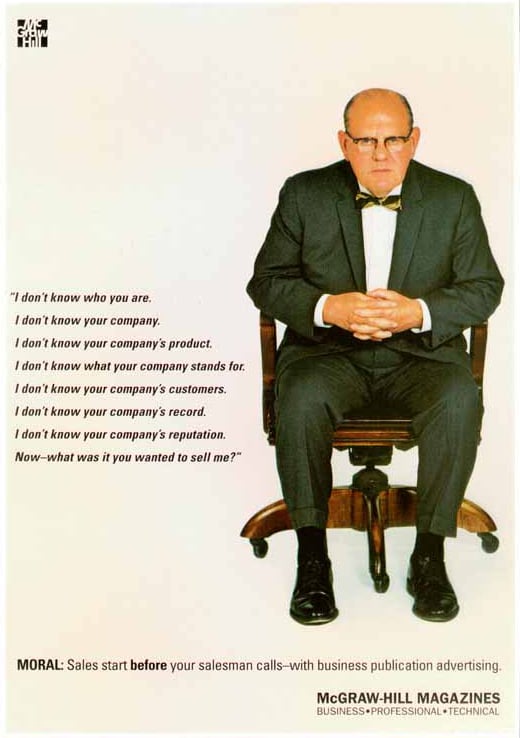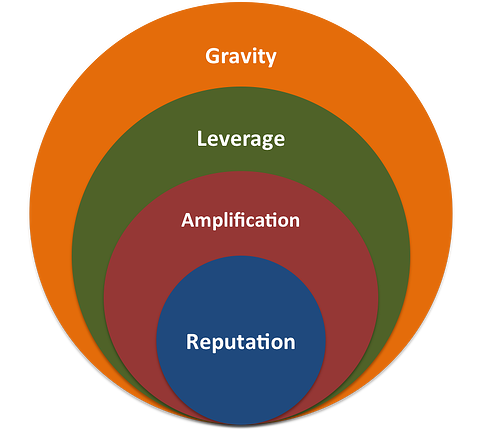 The ad above first appeared in Business Week in 1958 – yes that’s right over 50 years ago! The moral of the ad’s story was relevant then and it is even more relevant today: build relationships before you sell.
The ad above first appeared in Business Week in 1958 – yes that’s right over 50 years ago! The moral of the ad’s story was relevant then and it is even more relevant today: build relationships before you sell.
The bad news is that we live in far more cynical times than the sellers of the 1950’s; the good news is that YOU have so many more tools available to help you address the problem.
If you're investing in "Trusted Advisor Marketing" (it goes by several other names like inbound marketing, thought leadership marketing, and content marketing)... then you've probably asked yourself:
How (and when) will this generate a sale?
And that is the completely WRONG question to ask.
By the time you're done reading this article/ rant/ manifesto, you'll see exactly why - AND you'll be able to ask (and answer) much better questions for your business right away.
We interrupt with a brief metaphor... Asking when trusted advisor marketing will lead to a sale is like filling up your car's gas tank and asking, "Why aren't we there yet?"
Answer: Because filling your car with gas is a NECESSARY but NOT SUFFICIENT step to getting you to your destination (a new customer or client).
Do you have a chance of arriving now that your gas tank is full? You bet.
Did you have a chance of getting there with your tank on empty? No way.
Let's move on...
Insight #1 You need to sell the same way that YOU buy.
Look at your email spam or bulk email folder. Yes, you. Yes, right now. I'll wait...
tap... tap... tap... tap... You're back. Excellent.
Did you see that spam email from the toner cartridge company? Did you catch the pitch from the SEO firm that filled out your website's "contact us" form? Did you respond to that great deal on vacation cruises? NO?
OK now pop over to your paper mail pile on your desk. Did you check out the latest "triple play" offer from Comcast (or whatever hellacious Cable Satan runs in your neck of the woods)? How about that compelling cell phone offer from Verizon? The Wall Street Journal subscription offer under that postcard? Or how about that postcard - you know, the one from the home heating oil company? NO?
When's the last time you gave your credit card number over to a cold caller who interrupted your family dinner? NEVER??
I'm shocked...
Because you seem pretty excited about YOUR cold calls - and sending out YOUR spam - YOUR offers - YOUR postcards - YOUR sales messages.
The problem with doing it this way? In four words...
Zero. Value. For. Prospects.
And hello? YOU don't BUY this way. What in the world makes you think your prospects DO?
Look once more at the ad above - and answer one simple question:
Question #1: What VALUE have I ADDED to my prospect's world in order to EARN the RIGHT to INVITE them to a conversation and OFFER my solutions to their urgent, pervasive, expensive problems?
Insight #2 Referrals are great - but they are neither deaf, dumb, nor blind
The next thing you're going to tell me is that you don't NEED "trusted advisor marketing" because 99% of your business is repeat and referral business and it's always been that way and you don't see how this "newfangled marketing" is going to move the needle in closing more sales.
Do you seriously think that referrals don't check you out online before picking up the phone?
What messages are you sending to your valued referrals with...
a. Your outdated website (articles from 2008 are outdated, friends. And from 2003 even more so. And design aesthetic from 1997 most of all.)
b. Your sporadically updated blog that you leave dormant for 2 (or 4 or 6) months at a clip.
c. Your abandoned Twitter account you set up because someone said "you had to" and that now has 17 followers while your competitors have 3,000 (or a whole lot more.)
d. Your sketchy, bare bones LinkedIn profile that has 300 connections but only 2 recommendations (From 2005. From people with the same last name as you.)
e. Your "glory days" articles and TV clips and PR placements from 20 (yes I'm serious), 10, or even 5 years ago. Nothing screams "has-been" like old media.
Make no mistake: Getting repeat and referral business is great. But don't kid yourself that this absolves you from having a top-notch web presence, social media platform, and body of knowledge that is ultra-current, super-relevant, and obviously abundant.
In fact, you are leaving yourself open for EMBARRASSMENT if your advocates hear back from their referrals and find themselves in the awkward position of having to DEFEND you to them because your web presence has fallen behind and now casts your professional expertise into doubt.
Question #2: Does my overall web presence REASSURE and REINFORCE the referrals I earn with the most current, credible and relevant marketing messages, positioning, content, resources, and value that will make my advocates LOOK BETTER - not worse - for referring me?
Insight #3 Trusted Advisor Marketing is a 4-layer enchilada (aka You don't get to eat the delicious golden-brown cheese without first layering on the meat!!)

The first layer - at the core of the matter - is your Reputation. Your work. Your track record. If you stop there, you'll have a VERY hard time attracting NEW leads and prospects to your doorstep. "My work should speak for itself" is what a lot of very smart people say - smart people who have a hard time making their mortgage payments.
The second layer is Amplification. Ways to make your "signal" stronger. Enter social media marketing, niche PR, article marketing, blogging, keyword research and search engine optimization. This is the key to spreading your ideas and broadcasting your expertise.
The third layer is Leverage. This is where you begin to capitalize on your "trusted advisor" assets such as articles, blogs, videos, podcasts, interviews, white papers, special reports, book excerpts, and other value-first marketing tools. You can now reach out to high-probability prospects both individually (on LinkedIn for example) and collectively (on your blog for example). This is where your job becomes putting the right bait on the right hooks in the right lakes to catch the right fish.
The fourth layer is Gravity. Just like Jim Collins talks about the "flywheel" concept in Good to Great (it takes a long time to get it spinning but then is very hard to stop because of the power of momentum) - this is where you start to see payoffs. More leads, better prospects, bigger opportunities, more conversations, higher profile alliances, more invitations to speak, publish, guest post, contribute, teach, and (drum roll please...) more invitations to do great work at premium fees for great clients who NOW know you, like you, and trust you enough to hand over 5- and 6-figure checks because their level of confidence in your expertise is pretty damn close to 100%.
Question #3: Do you want to make more sales to strangers? (Good luck with that). Or do you really want more people to recognize, respect, and request YOU by name when they have a need, project, or problem that they instantly see has "your name written all over it"? If that's your goal, then trusted advisor marketing is for you.
Re-read the McGraw-Hill ad above and let's do a 21st century spin on it together...
- I don't know who you are.
- I don't read your blog.
- I don't subscribe to your newsletter.
- I don't see your name in my industry's publications.
- I don't hear my peers spreading your ideas.
- I don't come across your content in Google searches.
- I don't connect your solutions to my problems.
- I don't feel the gravity of your credibility or credentials.
- I don't have any tangible way to gauge your expertise or experience.
- Now -- what was it you wanted to sell me?
So here's the ultimate (and most important) question for YOU:
How can you realistically expect to SELL anything by NOT setting the necessary pre-conditions for ANY sale with Trusted Advisor Marketing?
The answer is as simple as it is obvious: you can't. Just like you can't drive your car from Denver to Sheboygan just by filling up your gas tank. You need to get behind the wheel, plan your route, use your GPS, add more fuel along the way (and probably some beef jerky and Sno-Balls and root beer) AND put in the hours and the miles to get you to your destination.
Nobody -- and I mean N-O-B-O-D-Y -- hires speakers, consultants or professional services firms sight unseen. You wouldn't. I wouldn't either.
And the facts prove out that today's buyers are just like YOU and ME.
Trusted Advisor marketing is a marathon, not a sprint. And as any marathoner will tell you - the best (and only) way to run a marathon is one mile at a time.
What do you think? Please post YOUR COMMENTS below and...





 Buyer persona marketing is not about knowing your customers or what they like to buy.
Buyer persona marketing is not about knowing your customers or what they like to buy. 



 Guest post by Diana Urban
Guest post by Diana Urban Here is special treat for you: A 45-minute content-packed interview with marketing coach and professional services marketing expert
Here is special treat for you: A 45-minute content-packed interview with marketing coach and professional services marketing expert  This week's Marketing Jackass Award goes to... me.
This week's Marketing Jackass Award goes to... me.
 Want to Grow Your Business With Blogging? Here’s Your Quick-Start Guide
Want to Grow Your Business With Blogging? Here’s Your Quick-Start Guide